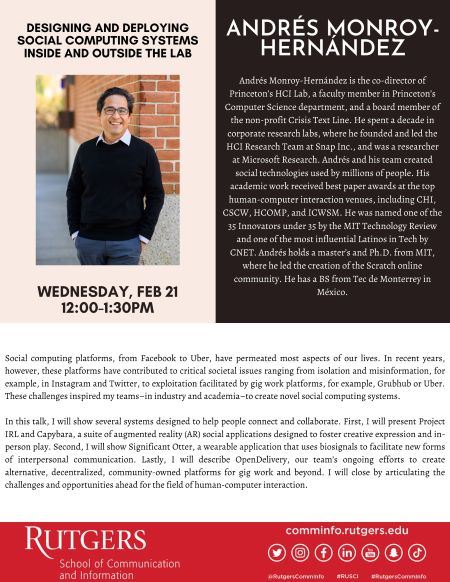February 21, Ph.D. Colloquium

 Designing and Deploying Social Computing Systems Inside and Outside the Lab
Designing and Deploying Social Computing Systems Inside and Outside the Lab
Abstract: Social computing platforms, from Facebook to Uber, have permeated most aspects of our lives. In recent years, however, these platforms have contributed to critical societal issues ranging from isolation and misinformation, for example, in Instagram and Twitter, to exploitation facilitated by gig work platforms, for example, Grubhub or Uber. These challenges inspired my teams–in industry and academia–to create novel social computing systems.
In this talk, I will show several systems designed to help people connect and collaborate. First, I will present Project IRL and Capybara, a suite of augmented reality (AR) social applications designed to foster creative expression and in-person play. Second, I will show Significant Otter, a wearable application that uses biosignals to facilitate new forms of interpersonal communication. Lastly, I will describe OpenDelivery, our team’s ongoing efforts to create alternative, decentralized, community-owned platforms for gig work and beyond. I will close by articulating the challenges and opportunities ahead for the field of human-computer interaction.
Bio: Andrés Monroy-Hernández is the co-director of Princeton’s HCI Lab, a faculty member in Princeton’s Computer Science department, and a board member of the non-profit Crisis Text Line. He spent a decade in corporate research labs, where he founded and led the HCI Research Team at Snap Inc., and was a researcher at Microsoft Research. Andrés and his team created social technologies used by millions of people. His academic work received best paper awards at the top human-computer interaction venues, including CHI, CSCW, HCOMP, and ICWSM. He was named one of the 35 Innovators under 35 by the MIT Technology Review and one of the most influential Latinos in Tech by CNET. Andrés holds a master’s and Ph.D. from MIT, where he led the creation of the Scratch online community. He has a BS from Tec de Monterrey in México.
 Designing and Deploying Social Computing Systems Inside and Outside the Lab
Designing and Deploying Social Computing Systems Inside and Outside the Lab
Abstract: Social computing platforms, from Facebook to Uber, have permeated most aspects of our lives. In recent years, however, these platforms have contributed to critical societal issues ranging from isolation and misinformation, for example, in Instagram and Twitter, to exploitation facilitated by gig work platforms, for example, Grubhub or Uber. These challenges inspired my teams–in industry and academia–to create novel social computing systems.
In this talk, I will show several systems designed to help people connect and collaborate. First, I will present Project IRL and Capybara, a suite of augmented reality (AR) social applications designed to foster creative expression and in-person play. Second, I will show Significant Otter, a wearable application that uses biosignals to facilitate new forms of interpersonal communication. Lastly, I will describe OpenDelivery, our team’s ongoing efforts to create alternative, decentralized, community-owned platforms for gig work and beyond. I will close by articulating the challenges and opportunities ahead for the field of human-computer interaction.
Bio: Andrés Monroy-Hernández is the co-director of Princeton’s HCI Lab, a faculty member in Princeton’s Computer Science department, and a board member of the non-profit Crisis Text Line. He spent a decade in corporate research labs, where he founded and led the HCI Research Team at Snap Inc., and was a researcher at Microsoft Research. Andrés and his team created social technologies used by millions of people. His academic work received best paper awards at the top human-computer interaction venues, including CHI, CSCW, HCOMP, and ICWSM. He was named one of the 35 Innovators under 35 by the MIT Technology Review and one of the most influential Latinos in Tech by CNET. Andrés holds a master’s and Ph.D. from MIT, where he led the creation of the Scratch online community. He has a BS from Tec de Monterrey in México.
